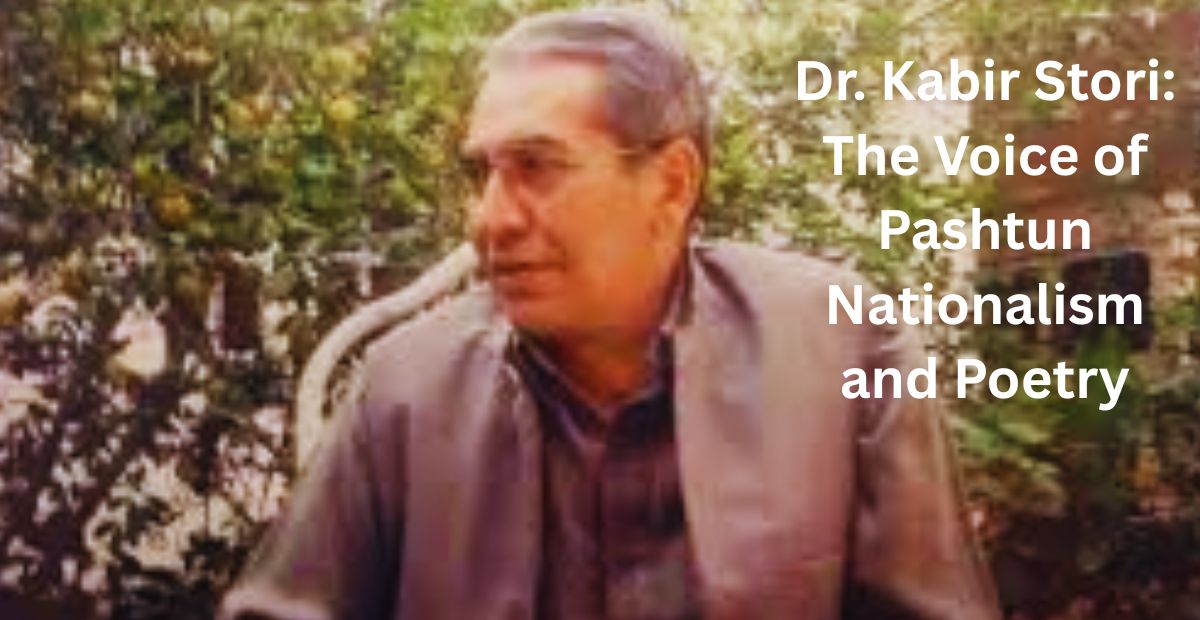Dr. Kabir Stori (6 April 1942 – 4 April 2006) was a renowned Pashtun nationalist, political leader, and poet whose life and work left a profound impact on the Pashtun identity and literature. Born in the serene village of Khas Kunar, Afghanistan, Stori emerged as a passionate advocate for Pashtun rights and cultural preservation, founding the Pashtoons Social Democratic Party (PSDP) and contributing significantly to Pashto literature and psychological research.
Early Life and Education
Kabir Stori, born Abdul Kabir Stori, hailed from the Mirdadkhel sub-tribe of the Yousafzai Pashtuns. After completing his primary education in Khas Kunar, he moved to Kabul’s Rahman Baba Lycee due to his exceptional academic performance. Recognized for his talents, he received a government scholarship to study in Germany, where he obtained advanced degrees in psychology, sociology, political science, and philosophy, earning his doctorate in natural sciences (Dr. rer. nat.) from the University of Frankfurt, Cologne, and Marburg.
Political Journey and Activism
Stori’s political activism began during his student years in Germany. In 1966, he joined the Afghan Students Association in Frankfurt and later co-founded both the General Union of Afghan Students (1972) and the National Liberation Union of Pashtuns and Balochs (1976).
His commitment to Pashtun nationalism led him to establish the Pashtoons Social Democratic Party (PSDP) in February 1981, the first political organization to unite Pashtuns from both Afghanistan and Pakistan. Despite political pressure, he rejected offers from both Mohammad Najibullah and Hamid Karzai to join their governments, staying loyal to his nationalist principles.
Arrest and Imprisonment in Pakistan
Dr. Stori’s activism brought him into conflict with General Zia-ul-Haq’s regime in Pakistan. On January 16, 1983, he was arrested in Peshawar during a family visit, accused of threatening national security through his advocacy for Pashtunistan. Reports later surfaced of torture during his imprisonment, lasting nearly 18 months. His detention gained international attention through Deutsche Welle and human rights groups in Germany, eventually leading to his release.
Literary Contributions
As a prolific poet and writer, Kabir Stori’s literary works are celebrated for their strong sense of patriotism, love for Pashto, and cultural pride. His poetry collections include:
- Skarwatta (Embers) – 1976
- Jwandi Khyaloona (Alive Thoughts) – 1997
- De Qalam Tora (Sword of the Pen) – 1999
- Sandareez Paigham (Message by the Songs) – 2002
- Khwagi Misrai (Sweetest Verses) – 2006
- Kulyat (Complete Works) – 2007
One of his most famous verses encapsulates his deep love for his mother tongue:
ساھ مې واخله خو پښــتو رانه وا نه اخلې
Take my breath, but don’t take my Pashto.
Academic Research and Publications
Aside from poetry, Dr. Stori made notable contributions to psychology, particularly in areas of fear, intelligence, and language psychology. Some of his academic works include:
- Wira (Fear): Theories, Measurement and Therapy – 1985
- De Wire Tala (Psychology) – 1992
- De Hukhyartia Tala (Intelligence Test) – 2000
- Zabsapohana (Language Psychology) – 2000
- Culture-Fair Intelligence Tests (CIT & NIT) in Pashto, English, and German – 2004
Cultural Efforts and Organizations
Kabir Stori played a foundational role in establishing several cultural institutions aimed at promoting Pashtun heritage and education, including:
- De Pakhtano Kulturi Tolana (1985)
- Pakhtoon Kor – Germany (1993)
- Pakhtoonkhwa Pohanay Dera – Peshawar (1998)
- Pakhto Adabi Hunari Tolana – Kunar (2003)
These platforms continue to preserve and promote Pashto literature and culture.
Death and Legacy
Dr. Kabir Stori passed away from a heart attack on 4 April 2006 in Wesseling, Germany, just two days before his 64th birthday. He was laid to rest in Khas Kunar, his beloved hometown.
To honor his legacy, the government of Afghanistan renamed his former school to “Dr. Kabir Stori Lycee” in 2013. His contributions continue to inspire generations of Pashtun activists, poets, and thinkers, including movements like the Pashtun Tahafuz Movement (PTM) led by Manzoor Pashteen, who shares familial and ideological ties with the PSDP.
Conclusion
Dr. Kabir Stori’s life was a blend of intellectual brilliance, poetic eloquence, and political courage. Through his dedication to Pashto language, Pashtun identity, and democratic values, he carved a permanent place in the hearts of his people. His legacy remains a powerful reminder of the enduring strength of cultural pride and the spirit of resistance against oppression.
Tags: #KabirStori #PashtoPoetry #PashtunNationalism #PSDP #AfghanHistory #PashtoLiterature #ManzoorPashteen #AfghanistanPolitics
